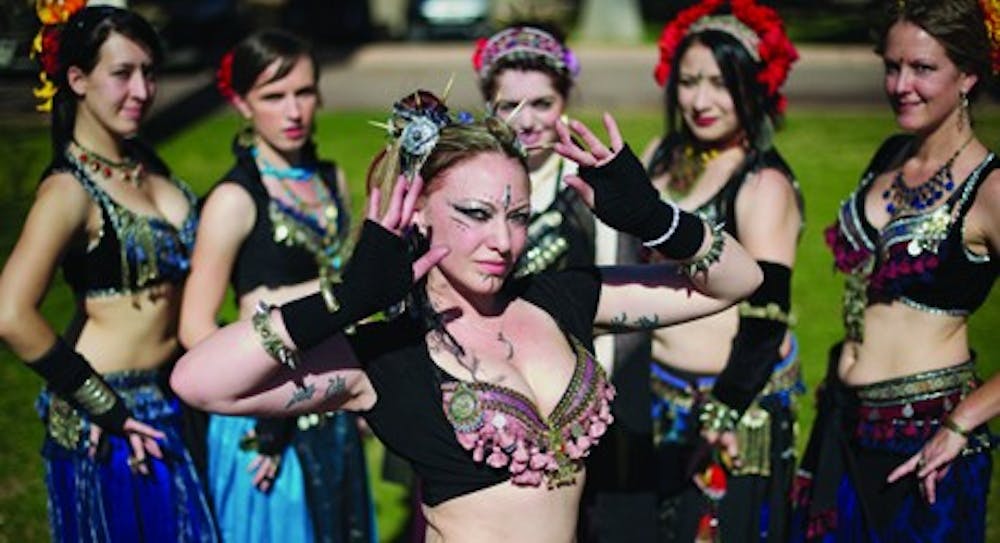A former model shared her experience with the modeling industry and the dangerous messages the media sends to young girls and women about their bodies through a documentary during ASU’s Body Pride Week.
Nicole Clark, former international fashion model turned filmmaker, left her university studies of biological sciences to become a model.
What she called “a waste of four years of my life” became an inspiration for her documentary, “Cover Girl Culture: Awakening the Media Generation,” which she presented at a screening Tuesday night at ASU. It was her first university speaking engagement to promote the film.
The documentary explores the impact of fashion, modeling, advertising and celebrity on teens and young women.
“I wasn’t proud to be a model, because I was part of the problem,” Clark said.
Clark worked for Elite Model Management, an international modeling agency that represents clients from Heidi Klum to Tyra Banks.
Though she was an athlete and maintained a healthy body as a model, Clark said she wanted to contribute more to society and left the industry after being a “silent witness” to the issues of poor body image, eating disorders and pressure she would later document. She began taking classes in nutrition, scriptwriting and improvisation.
After encouragement from a filmmaker friend, Clark produced her documentary independently and premiered it in film festivals in 2009 after five years in the making.
Manju Ramadurai, activity adviser of ASU’s Student Organization Resource Center, said after hearing about the documentary from a friend, she thought it would be an ideal part of the week’s events.
“The purpose of Body Pride Week events is to raise awareness and educate the campus community about eating disorders and body image issues,” Ramadurai said.
Body Pride Week started Feb. 7 and continues through Friday on the Tempe campus.
“We hope the message that the students will take home from the documentary screening is to be comfortable with who they are and stop the quest for physical perfection and not be influenced by media imagery,” Ramadurai said.
Clark interviewed models, self-esteem and body experts, and analyzed popular fashion magazines for the film, but a major portion was dedicated to the effect of sexualization on young girls.
Clark said what shocked and surprised her the most during her research was how focused the industry is now on the sexualization of teen and tween girls, with the line blurring between what makes a woman and a teenage girl because of companies like Victoria’s Secret Pink.
But not all college-age students are clued in or aware of how their choices are affected, Clark noted.
Repetition, humor and using actors and celebrities are some of the ways society swallows certain thoughts and values on issues that it normally would judge differently, she said.
People can make a collective conscious decision by choosing where to spend their money when shopping, Clark said, because, “every dollar is your voice, your vote.”
Chicano studies freshman Debbie Robles reflected on that pressure while looking at educational panels during Monday’s Body Pride Fair at Hayden Lawn and was surprised at the amount of touch-ups on the models’ bodies in magazine ads.
She said she felt pressure when she was younger to achieve the media standard of sex appeal, but now has learned to separate herself from those messages.
“You have your own power to choose how you want to look,” Robles said.
She said she knows one company that sends positive ideas of body acceptance for women.
“I always admired Dove for using models of all ages, shapes and sizes. It’s nice to see a few companies and products advertised in the right way,” she said.
Clark is also optimistic about the future of advertising.
“Really, it’s all about us being advocates of change,” Clark said. “There’s a lot more people outside of the industry than in.”
If men and women continue to focus on the exterior instead of important issues like health care and education, Clark said, “We will be America the beautiful, but not America so bright.”
Other events planned during Body Pride Week include a clothing drive, a documentary screening on Thursday titled, “Tough Guise,” exploring contemporary attitudes toward masculinity and violence, and resources and tables staffed by various student organization and University services that provide assistance and information on healthy living.
Reach the reporter at naberra@asu.edu





